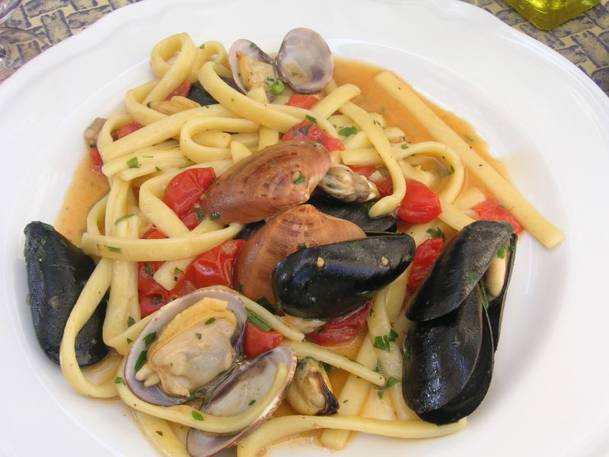


Recently the authenticity of Italian cuisine in America has come under fire, as many industry professionals believe the cuisine has been hijacked by food media, chefs, journalist, and amateur cooks. Some feel that Italian cuisine is being misrepresented and the general public lacks a clear understanding about the products and the techniques used in authentic Italian cooking. Though the question of what is truly authentic has yet to be defined. Italy is made up of twenty regions, each with its own unique and joyous personality. Further is the idea of codifying Italian cuisine something Italian Americans care more about than Italians abroad? What role do the ingredients play when dealing with authenticity?
Certainly there are common threads throughout Italy, but thankfully none of its regions cuisines are identical. Ingredients differ, techniques vary, and recipes are passed down verbally from generation to generation, leaving room for interpretation and the inevitable evolution of the cuisine.
My family’s business was founded on the principal of importing, marketing and retailing made in Italy products, so I believe strongly in the usage, education, and distribution of authentic Italian ingredients. Thankfully availability for genuine products such as Parmigiano Reggiano and Prosciutto Di Parma has increased. Few dispute that such products are the foundation of the cuisine. Some arguments are made that locally grown and sourced products are just as good, and at times better. But that is a matter of taste.
Though in the past, when some of these ingredients weren’t as widely available as they are today, Italian Americans honed their spirit of ingenuity and improvised with what they had available. Pizza is a prime example of a Neapolitan food that was Americanized to find many failures, but also some great successes. The combination of Italian passion and American ingenuity has made for some flawed but oftentimes fantastic authentic Italian American dishes.
In order to better understand this issue of authenticity perhaps we should focus less on the ingredients and techniques and more on the purpose. After all isn’t the soul of Italian cuisine rooted in the passion of its chefs, ambassadors, and enthusiast? I think all parties can agree that this passion is something all the regions of Italy proudly share.
Perhaps this passion for Italian culture is arguably the most important and authentic ingredient of the cuisine. American chefs throughout the country are creating as well as recreating wonderful and unique dishes that bring to the plate an enthusiasm that is distinctively Italian. They may not be text book cases, but isn’t that the point?
It is inspiring to see so many amateur cooks across the country with an appetite for all things Italian; they are stocking up on dried pastas from Grangano, filling their pantries with Sicilian tunas packed in extra virgin olive oil, and gathering in the kitchen, united through cucina Italian. Culinary classes are selling out across the country to great success in order to teach us how to make pizza at home (Pizza a Casa [2]), prepare a tasteful charcuterie board (Astor Center [3]), or make the perfect espresso (Illy [4]). Culinary tours, both domestic and international (Scotts Pizza Tour [5], Love of Pizza Tour [6]) are widely popular. Even a recent article in the New York Times [7] talked about the growing popularity of culinary classes for bachelor and bachelorette parties. Authentic, hard to say, But the passion is real and the spirit is genuine.
As an amateur cook I find Italian cookery to be such a powerful and inspiring cuisine because of its accessibility. I now realize as a young boy gathering around my grandmothers table that dinner wasn’t really about the foods we ate. The food was there to unite us, so that we could share our hopes, dreams, and lives. To me this is authentic Italian.
The ingredients may be Italian, Italian style, or something in-between, but the passion that is uniting us is most definitely authentic Italian. Because in the end isn’t the most important ingredient of cucina Italian the love of the shared table?
The authenticity of a cuisine should be defined by its people. The ingredients are the tools, but without the overwhelming passion of all the chefs (Italian or otherwise), restaurateurs, journalist, media outlets, grandmothers, eager amateurs, and yes even bloggers, where would Italian cuisine be?
Only in Italy I suppose, and what fun would that be?
Source URL: http://iitaly.org/magazine/dining-in-out/articles-reviews/article/heaping-passion-means-authenticity
Links
[1] http://iitaly.org/files/15002ali-0591278246676jpg
[2] http://www.pizzaacasa.com/Home.html
[3] http://www.astorcenternyc.com/
[4] http://www.illy.com/wps/wcm/connect/US/illytools/footer/news/news-master-barista-series-may
[5] http://www.scottspizzatours.com/
[6] http://loveofpizzatour.com/Home.html
[7] http://www.nytimes.com/2010/06/23/dining/23bachelor.html?scp=1&sq=pizza%20a%20casa&st=cse